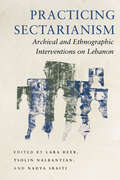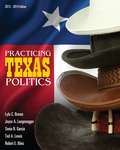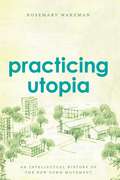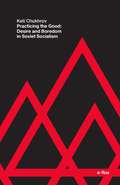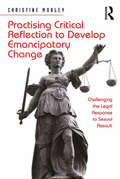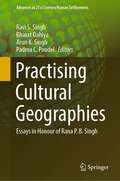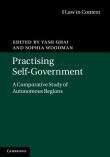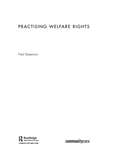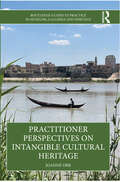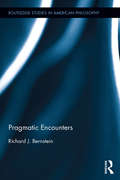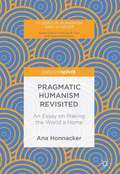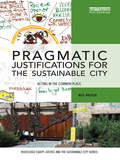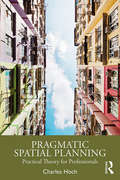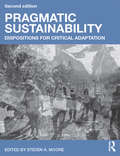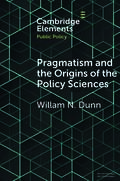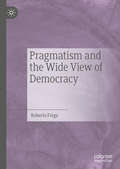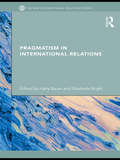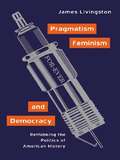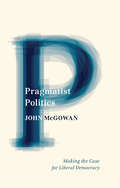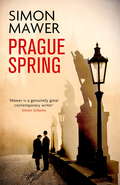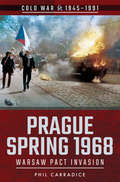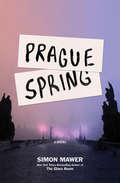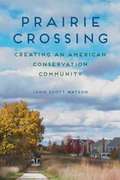- Table View
- List View
Practicing Professional Ethics in Economics and Public Policy
by Elizabeth A.M. Searing Donald R. SearingThis volume explores the professional ethics of addresses the varied ethical needs of the professional economists and public policy professionals. Using terms and methods familiar to the reader, the book goes beyond the typical narrative of economics and morality to walk the professional through the process of ethical decision-making. Designed to be easy to navigate and applicable to everyday practice, this book includes a step-by-step illustrated guide through an ethical decision-making process using a methodology specifically tailored to economists and policy professionals. It describes numerous unique ethical tests and resolution methods which are utilized in a portfolio structure. The book also includes a brief and convenient catalogue of important figures in philosophy and ethics, translated into their policy applications; it concludes with candid advice from experts in different subfields on how ethics impacts their professional lives. This volume provides a foundation and framework for those in economics and public policy to implement a relevant practice of professional ethics both at and in their work.
Practicing Sectarianism: Archival and Ethnographic Interventions on Lebanon
by Lara Deeb, Tsolin Nalbantian, and Nadya SbaitiPracticing Sectarianism explores the imaginative and contradictory ways that people live sectarianism. The book's essays use the concept as an animating principle within a variety of sites across Lebanon and its diasporas and over a range of historical periods. With contributions from historians and anthropologists, this volume reveals the many ways sectarianism is used to exhibit, imagine, or contest power: What forms of affective pull does it have on people and communities? What epistemological work does it do as a concept? How does it function as a marker of social difference? Examining social interaction, each essay analyzes how people experience sectarianism, sometimes pushing back, sometimes evading it, sometimes deploying it strategically, to a variety of effects and consequences. The collection advances an understanding of sectarianism simultaneously constructed and experienced, a slippery and changeable concept with material effects. And even as the book's focus is Lebanon, its analysis fractures the association of sectarianism with the nation-state and suggests possibilities that can travel to other sites. Practicing Sectarianism, taken as a whole, argues that sectarianism can only be fully understood—and dismantled—if we first take it seriously as a practice.
Practicing Texas Politics (15th Edition)
by Lyle Brown Robert E. Biles Sonia R. Garcia Joyce A. Langenegger Ted A. LewisNew information about policymaking and analysis about politics in the Lone Star State is written by top Texas politics scholars.
Practicing Utopia: An Intellectual History of the New Town Movement
by Rosemary WakemanThe typical town springs up around a natural resource--a river, an ocean, an exceptionally deep harbor--or in proximity to a larger, already thriving town. Not so with "new towns," which are created by decree rather than out of necessity and are often intended to break from the tendencies of past development. New towns aren't a new thing--ancient Phoenicians named their colonies Qart Hadasht, or New City--but these utopian developments saw a resurgence in the twentieth century. In Practicing Utopia, Rosemary Wakeman gives us a sweeping view of the new town movement as a global phenomenon. From Tapiola in Finland to Islamabad in Pakistan, Cergy-Pontoise in France to Irvine in California, Wakeman unspools a masterly account of the golden age of new towns, exploring their utopian qualities and investigating what these towns can tell us about contemporary modernization and urban planning. She presents the new town movement as something truly global, defying a Cold War East-West dichotomy or the north-south polarization of rich and poor countries. Wherever these new towns were located, whatever their size, whether famous or forgotten, they shared a utopian lineage and conception that, in each case, reveals how residents and planners imagined their ideal urban future.
Practicing the Good: Desire and Boredom in Soviet Socialism (e-flux)
by Keti ChukhrovA philosophical consideration of Soviet Socialism that reveals the hidden desire for capitalism in contemporary anticapitalist discourse and theory This book, a philosophical consideration of Soviet socialism, is not meant simply to revisit the communist past; its aim, rather, is to witness certain zones where capitalism&’s domination is resisted—the zones of countercapitalist critique, civil society agencies, and theoretical provisions of emancipation or progress—and to inquire to what extent those zones are in fact permeated by unconscious capitalism and thus unwittingly affirm the capitalist condition. By means of the philosophical and politico-economical consideration of Soviet socialism of the 1960 and 1970s, this book manages to reveal the hidden desire for capitalism in contemporaneous anticapitalist discourse and theory. The research is marked by a broad cross-disciplinary approach based on political economy, philosophy, art theory, and cultural theory that redefines old Cold War and Slavic studies&’ views of the post-Stalinist years, as well as challenges the interpretations of this period of historical socialism in Western Marxist thought.
Practising Critical Reflection to Develop Emancipatory Change: Challenging the Legal Response to Sexual Assault
by Christine MorleyOverwhelmingly, critical practitioners working across a range of human service fields, who are committed to emancipatory and progressive social change ideals, report feeling powerless, alienated from the means of change, and hopeless about their capacities to make a difference in the lives of the individuals, groups or communities with whom they work because of restrictive contexts that ultimately determine the nature and parameters of their work. This ground-breaking book addresses this dilemma by demonstrating how critical reflection as an educational tool enables practitioners to envision possibilities for change. The legal system, particularly in its response to sexual assault provides a perfect example of this type of context and this volume explores the work of sexual assault practitioners that are engaged in supporting victims/survivors of sexual assault through the legal process. By reshaping ideas that have previously been considered as predominantly theoretical and abstract, Morley’s work provides an innovative framework that enables social work and human services practitioners to find hope, agency and practical strategies to work towards change, despite operating in contexts that appear immutably oppressive.
Practising Cultural Geographies: Essays in Honour of Rana P. B. Singh (Advances in 21st Century Human Settlements)
by Bharat Dahiya Arun K. Singh Ravi S. Singh Padma C. PoudelThis festschrift honours Prof. Rana P.B. Singh who has dedicated his life to teaching and conducting research on cultural geography with a ‘dweller Indian perspective’. The book focuses on the cultural geographies of India, and to an extent that of South Asia. It is a rich collection of 23 essays on the themes apprised by him, covering landscapes, religion, heritage, pilgrimage and tourism, and human settlements.
Practising Self-Government
by Yash Ghai Sophia WoodmanAutonomy provides a framework that allows for regions within countries to exercise self-government beyond the extent available to other sub-state units. This book presents detailed case studies of thirteen such autonomies from around the world, in which noted experts on each outline the constitutional, legal and institutional frameworks as well as how these arrangements have worked in practice to protect minority rights and prevent secession of the territories in question. The volume's editors draw on the case studies to provide a comparative analysis of how autonomy works and the political and institutional conditions under which it is likely to become a workable arrangement for management of the differences that brought it into being.
Practising Welfare Rights (The Social Work Skills Series)
by Neil BatemanPractising Welfare Rights aims to improve awareness among people working in social work and advice agencies about the skills required for effective welfare rights work, and offers guidance for managers and other professionals about how to develop a welfare rights service. Written by a well-known author, trainer and adviser on welfare rights issues, this book includes: learning objectives activities to test understanding illustrative case studies. It also covers core welfare rights skills, such as interviewing, legal research, negotiation and advocacy, and discusses the historical, social and economic forces which have shaped welfare rights practice as well as the politics of welfare. An accessible book which highlights the place of welfare rights practice in modern society.
Practitioner Perspectives on Intangible Cultural Heritage (Routledge Guides to Practice in Museums, Galleries and Heritage)
by Joanne OrrPractitioner Perspectives on Intangible Cultural Heritage provides an accessible introduction to the Intangible Cultural Heritage field. Summarising the major changes that have taken place over the last two decades, the book explores ongoing debates and changes in thinking about best practice. Drawing on the author’s own experience of operationalising the UNESCO 2003 Convention for the Safeguarding of Intangible Cultural Heritage in a variety of contexts, Orr also incorporates international case studies from practitioners and provides valuable insights about best practices. Demonstrating that the top-down, state-driven hierarchy for the safeguarding of heritage is starting to shift to a model of shared ownership and values driven by communities and practitioners, the book shows that the notion of the ‘expert’ is also diversifying to include other forms of transmission of traditional knowledge. Orr argues that these different perspectives provide a platform to enrich understanding and knowledge and create a stronger basis for the safeguarding of heritage - both intangible and tangible. Exploring some of the policy developments that have laid the foundations for the future involvement of community and practitioners in the global discourse, the book also suggests how practitioners can expand networks and contribute to the global discourse. Practitioner Perspectives on Intangible Cultural Heritage will appeal to museum curators and other heritage professionals, as well as students and academics engaged in the study of museums and heritage, art, and cultural policy and management.
Pragmatic Encounters (Routledge Studies in American Philosophy)
by Richard J. BernsteinRichard J. Bernstein is a leading exponent of American pragmatism and one of the foremost philosophers of the twentieth century. In this collection he takes a pragmatic approach to specific problems and issues to demonstrate the ongoing importance of this philosophical tradition. Topics under discussion include multiculturalism, political public life, evil and religion. Individual philosophers studied are Kant, Arendt, Rorty, Habermas, Dewey and Trotsky. Each of the sixteen essays, many of which are published here for the first time, offers a way of bridging contemporary philosophical differences. This book will be of interest to scholars of philosophy and those researching social and political theory.
Pragmatic Humanism Revisited: An Essay on Making the World a Home (Studies in Humanism and Atheism)
by Ana HonnackerHow can we feel at home in this world without clinging to false certainties? This book offers a humanist re-reading of philosophical pragmatism and explores its potentials for a worldview that relies only on human resources. Thinking along with authors like William James and F.C.S. Schiller, it highlights a fundamentally humanist strand of pragmatism aimed at fostering human creativity and transformative action. It is grounded in everyday experience and underlines our responsibility to strive for the better. Ana Honnacker traces perspectives on science, religion, and ethics in the light of a pragmatic understanding of humanism. Furthermore, she suggests how to address the existential challenges we face today. Thus, pragmatic humanism is explored not only as a philosophy for critical minds, but also as a way of life.
Pragmatic Justifications for the Sustainable City: Acting in the common place (Routledge Equity, Justice and the Sustainable City series)
by Meg HoldenWhat can justice and sustainability mean, pragmatically speaking, in today’s cities? Can justice be the basis on which the practices of city building rely? Can this recognition constitute sustainability in city building, from a pragmatic perspective? Today, we are faced with a mountain of reasons to lose hope in any prospect of moving closer to justice and sustainability from our present position in civilization. Pragmatic Justifications for the Sustainable City: Acting in the Common Place offers a critical and philosophical approach to revaluating the way in which we think and talk about the "sustainable city" to ensure that we neither lose the thread of our urban history, nor the means to live well amidst diversity of all kinds. By building and rebuilding better habits of urban thinking, this book promotes the reconstruction of moral thinking, paving the way for a new urban sustainability model of justice. Utilizing multidisciplinary case studies and building upon anti-foundationalist principles, this book offers a pragmatic interpretation of sustainable development concepts within our emerging global urban context and will be a valuable resource for both undergraduate and postgraduate students, as well as academics and professionals in the areas of urban and planning policy, sociology, and urban and environmental geography.
Pragmatic Spatial Planning: Practial Theory for Professionals
by Charles HochInstead of seeking theory to justify practical professional judgments this book describes how professionals can and should use theory to guide these judgments. Professional spatial planning in the US, and globally, continues to suffer from a weak conceptual grasp of its own practice. Practitioners routinely recognize the value and wisdom of practical judgment finely attuned to context, nuance and complexity; but later offer banal testimony and glib stories of ‘just so’ best-practice discrediting the ambiguity of their own experience. The chapters in this book provide a vocabulary tailored to the conventions of practical judgment, challenging students and practitioners to treat professional expertise as work in progress rather than ‘best’ practice. Instead of seeking theory to justify practical professional judgments, Hoch describes how professionals can and should use theory to guide these judgments. The pragmatist plan helps cope with complexity rather than control it, making it invaluable in the anyone’s pursuit of a planning career. This book will appeal to a wide cross section of students and scholars, especially those working in urban planning, public policy, and government.
Pragmatic Sustainability: Dispositions for Critical Adaptation
by Steven A. MooreThis second edition of Pragmatic Sustainability proposes a pragmatic, discursive and pluralistic approach to thinking about sustainability.. Rather than suggesting a single solution to the problem of how to live sustainably, this collection discusses broader approaches to social and environmental change. Eight continuing authors and seven new ones adjust their dispositions toward rapidly changing and still unsustainable conditions, forging agreements and disagreements on five overlapping themes: the Grounds for Sustainability; the critique of Technological Culture; the need to conceive of Sustainability in Place; in Cities; finally asking how should we reimagine the fraught relationship between Civil Society, Industry and Regulation? Editor Steven A. Moore asks how a set of ideas now more than a century old remains relevant. A partial answer can be found in reconstructing the very modern ideas confronted by those who came to call themselves Pragmatists at the beginning of the twentieth century—evolution, ecology and design. Moore argues that we have yet to develop dispositions in theory and practice that critically integrate these ideas into sustainable development. In sum, this new edition provides a fresh and hopeful look at the wicked problems deliberated by almost anyone engaged in adapting to the always changing conditions of the built world.
Pragmatism and the Origins of the Policy Sciences: Rediscovering Lasswell and the Chicago School (Elements in Public Policy)
by William N. DunnAn examination of the origins of the policy sciences in the School of Pragmatism at the University of Chicago in the period 1915-1938. Harold D. Lasswell, the principal creator of the policy sciences, based much of his work on the perspectives of public policy of John Dewey and other pragmatists at Chicago. Characteristics of the policy sciences include orientations that are normative, policy-relevant, contextual, and multi-disciplinary. These orientations originate in pragmatist principles of the unity of knowledge and action and functionalist explanations of action by reference to values. These principles are central to the future development of the policy sciences.
Pragmatism and the Wide View of Democracy
by Roberto FregaThe aim of this book is to provide a fresh, wider, and more compelling account of democracy than the one we usually find in conventional contemporary political theory. Telling the story of democracy as a broad societal project rather than as merely a political regime, Frega delivers an account more in tune with our everyday experience and ordinary intuitions, bringing back into political theory the notion that democracy denotes first and foremost a form of society, and only secondarily a specific political regime.The theoretical shift accomplished is major. Claiming that such a view of democracy is capable of replacing the mainstream categories of justice, freedom and non-domination in their hegemonic function of all-encompassing political concepts, Frega then argues for democracy as the broader normative framework within which to rethink the meaning and forms of associated living in all spheres of personal, social, economic, and political life. Drawing on diverse traditions of American pragmatism and critical theory, as well as tackling political issues which are at the core of contemporary theoretical debates, this book invites a rethinking of political theory to one more concerned with the political circumstances of social life, rather than remaining confined in the narrowly circumscribed space of a theory of government.
Pragmatism in International Relations (New International Relations)
by Elisabetta Brighi Harry BauerThis collection of essays introduces pragmatism to the study of international relations and evaluates its potential for the theory and practice of global politics. Seeking to reorient the discipline of International Relations (IR) towards practices and problematic situations, the editors of this volume draw on the pragmatist tradition to provide critical inspiration for this task. Their book, organised into four distinct parts, aims to outline the potential of pragmatism to reconstruct IR. Through such an approach this volume seeks to re-invigorate the discipline and bridge the gap between IR academic communities in the US, UK, and continental Europe. This pioneering volume provides: the first book-length evaluation of the potential pragmatism holds for the practice as well as the epistemological, theoretical and normative debates within the discipline of IR theoretical reflections and empirical studies in the area of diplomacy, international law, public (environmental) policy and the Arab-Israeli conflict highly original contributions by prominent scholars in the field of IR, International Law, Sociology and Social Theory Drawing on research from several disciplines, Pragmatism in International Relations will be vital reading for students and scholars of International Relations, International Relations Theory, and Social Theory.
Pragmatism, Feminism, and Democracy: Rethinking the Politics of American History
by James LivingstonPragmatism, Feminism, and Democracy is James Livingston's virtuoso reflection on the period between 1890 and 1930, a primal scene of American history during which a wave of intellectual currents came together--and fell apart--to reorient society. Tying in critical insights on corporate capitalism, consumer culture, populism, and the American Left, Livingston analyzes the intersections and similarities of pragmatism and feminism to yield an original, provocative blend of historiography, feminist theory, and American intellectual history.
Pragmatist Politics: Making the Case for Liberal Democracy
by John McGowanIn our current age of cynicism, John McGowan suggests that the time is right to take a fresh look at pragmatism, the philosophy of American democracy. As McGowan shows, pragmatism can be an inspiring alternative to the despair that seems to dominate contemporary American politics. Pragmatist Politics is passionate and convincing, both heartfelt and clear-eyed. It offers an expansive vision of what the United States could be and should be.From John Dewey and William James, McGowan derives a history of democracy as a way of life, characterized by a distinctive ethos and based on an understanding of politics as potentially effective collective agency. That democratic ideal is wedded to a liberalism that focuses on extending the benefits of democracy and of material prosperity to all. Beyond the intellectual case for liberal democracy, McGowan turns to how James, especially, was attuned to the ways that emotional appeals often trump persuasion through arguments, and he examines the work of Kenneth Burke, among others, to investigate the link between liberal democracy and a comic view of human life. Comedy, McGowan notes, allows consideration of themes of love, forgiveness, and generosity that figure far too infrequently in philosophical accounts of politics.In McGowan&’s work, the combination of pragmatism and comedy takes us on a wide-ranging exploration of what American politics—and by extension American life—could actually be like if it truly reflected American values.
Prague Spring
by Simon Mawer'Prague Spring is a wonderfully atmospheric portrait of the city as well as a political and historical thriller with dashes of espionage. It is as brilliant as anything he has written, which is saying a lot' The TimesIt's the summer of 1968, the year of love and hate, of Prague Spring and Cold War winter. Two English students, Ellie and James, set off to hitch-hike across Europe with no particular aim in mind but a continent, and themselves, to discover. Somewhere in southern Germany they decide, on a whim, to visit Czechoslovakia where Alexander Dubcek's 'socialism with a human face' is smiling on the world.Meanwhile Sam Wareham, a first secretary at the British embassy in Prague, is observing developments in the country with a mixture of diplomatic cynicism and a young man's passion. In the company of Czech student Lenka Konecková, he finds a way into the world of Czechoslovak youth, its hopes and its ideas. It seems that, for the first time, nothing is off limits behind the Iron Curtain.Yet the wheels of politics are grinding in the background. The Soviet leader, Leonid Brezhnev is making demands of Dubcek and the Red Army is massed on the borders. How will the looming disaster affect those fragile lives caught up in the invasion?
Prague Spring
by Simon Mawer'Prague Spring is a wonderfully atmospheric portrait of the city as well as a political and historical thriller with dashes of espionage. It is as brilliant as anything he has written, which is saying a lot' The TimesIt's the summer of 1968, the year of love and hate, of Prague Spring and Cold War winter. Two English students, Ellie and James, set off to hitch-hike across Europe with no particular aim in mind but a continent, and themselves, to discover. Somewhere in southern Germany they decide, on a whim, to visit Czechoslovakia where Alexander Dubcek's 'socialism with a human face' is smiling on the world.Meanwhile Sam Wareham, a first secretary at the British embassy in Prague, is observing developments in the country with a mixture of diplomatic cynicism and a young man's passion. In the company of Czech student Lenka Konecková, he finds a way into the world of Czechoslovak youth, its hopes and its ideas. It seems that, for the first time, nothing is off limits behind the Iron Curtain.Yet the wheels of politics are grinding in the background. The Soviet leader, Leonid Brezhnev is making demands of Dubcek and the Red Army is massed on the borders. How will the looming disaster affect those fragile lives caught up in the invasion?
Prague Spring 1968: Warsaw Pact Invasion (Cold War, 1945–1991)
by Phil CarradiceA historian&’s overview of Czechoslovakia&’s Alexander Dubček, the Prague Spring of 1968, and the Warsaw Pact Invasion. Cold War nadir: January 1968 and in Czechoslovakia, the new Communist Party leader, Alexander Dubcek, has made it clear that this is the opportunity to loosen the Soviet stranglehold on the country. As the Prague winter slowly eases into a Prague spring, it really does seem as if Dubček has judged it right. Reforms in oppressive censorship laws, improved housing, a lessening of totalitarian oppression, Dubček promises and delivers on it all. The new regime in Czechoslovakia does seek to destroy communism but it does want to choose its own political destiny. And then, on the night of 20/21 August, the Prague Spring is crushed by the Warsaw Pact invasion: 200,000 Communist troops, mostly Soviet but also Polish and East German, flood the country. The resulting protests and rallies against the invasion, mostly by young people, are violent and bloody. Hundreds die in clashes; self-immolation, in public and before the eyes of the world, brings home the horror and the depth of feeling in the Czech people. It is the end of the Prague Spring, the reformation of Czechoslovakia having ended in ruins. But despite the brutal crushing of Czech hopes and dreams, the events of 1968 lay the foundations for future change. It will take another two decades but it is, ultimately, where the unraveling of the Communist bloc begins.
Prague Spring: A Novel
by Simon MawerNew York Times bestselling author of The Glass Room Simon Mawer returns to Czechoslovakia, this time during the turbulent 1960s, with a suspenseful story that mixes sex, politics, and betrayal.In the summer of 1968--a year of love and hate, of Prague Spring and Cold War winter--Oxford students James Borthwick and Eleanor Pike set out to hitchhike across Europe, complicating a budding friendship that could be something more. Having reached southern Germany, they decide on a whim to visit Czechoslovakia, where Alexander Dubček's "socialism with a human face" is smiling on the world.Meanwhile, Sam Wareham, First Secretary at the British embassy in Prague, is observing developments in the country with both a diplomat's cynicism and a young man's passion. In the company of Czech student Lenka Konečková, he finds a way into the world of Czechoslovak youth, its hopes and its ideas. For the first time, nothing seems off limits behind the Iron Curtain. Yet the wheels of politics are grinding in the background. The Soviet leader Leonid Brezhnev is making demands of Dubček, and the Red Army is amassed on the borders. How will the looming disaster affect those fragile lives caught up in the invasion?With this shrewd, engrossing, and sensual novel, Simon Mawer cements his status as one of the most talented writers of historical spy fiction today.
Prairie Crossing: Creating an American Conservation Community
by John Scott WatsonCarved out of century-old farmland near Chicago, the Prairie Crossing development is a novel experiment in urban public policy that preserves 69 percent of the land as open space. The for-profit project has set out to do nothing less than use access to nature as a means to challenge America's failed culture of suburban sprawl. The first comprehensive look at an American conservation community, Prairie Crossing goes beyond windmills and nest boxes to examine an effort to connect adults to the land while creating a healthy and humane setting for raising a new generation attuned to nature. John Scott Watson places Prairie Crossing within the wider context of suburban planning, revealing how two first-time developers implemented a visionary new land ethic that saved green space by building on it. The remarkable achievements include a high rate of resident civic participation, the reestablishment of a thriving prairie ecosystem, the reintroduction of endangered and threatened species, and improved water and air quality. Yet, as Watson shows, considerations like economic uncertainty, lack of racial and class diversity, and politics have challenged, and continue to challenge, Prairie Crossing and its residents.
